I want to write the first part of the Smith-Waterman algorithm in python with basic functions.
I found this example, but it doesn't give me what I'm looking for.
def zeros(X: int, Y: int):
# ^ ^ incorrect type annotations. should be str
lenX = len(X) + 1
lenY = len(Y) + 1
matrix = []
for i in range(lenX):
matrix.append([0] * lenY)
# A more "pythonic" way of expressing the above would be:
# matrix = [[0] * len(Y) + 1 for _ in range(len(x) + 1)]
def score(X, Y):
# ^ ^ shadowing variables from outer scope. this is not a bug per se but it's considered bad practice
if X[n] == Y[m]: return 4
# ^ ^ variables not defined in scope
if X[n] == '-' or Y[m] == '-': return -4
# ^ ^ variables not defined in scope
else: return -2
def SmithWaterman(X, Y, score): # this function is never called
# ^ unnecessary function passed as parameter. function is defined in scope
for n in range(1, len(X) + 1):
for m in range(1, len(Y) + 1):
align = matrix[n-1, m-1] + (score(X[n-1], Y[m-1]))
# ^ invalid list lookup. should be: matrix[n-1][m-1]
indelX = matrix[n-1, m] + (score(X[n-1], Y[m]))
# ^ out of bounds error when m == len(Y)
indelY = matrix[n, m-1] + (score(X[n], Y[m-1]))
# ^ out of bounds error when n == len(X)
matrix[n, m] = max(align, indelX, indelY, 0)
# this should be nested in the inner for-loop. m, n, indelX, and indelY are not defined in scope here
print(matrix)
zeros("ACGT", "ACGT")
On a book I found this algorithm, but I couldn't implement it correctly.
input: sequences s and t, with |s| =n, |t| = m, score function, penality InDel
match +1, mismatch -2, InDel -1
M = matrix of size n+1 * m+1
M[i,j] = 0
i=j=0
Any help please Thanks
